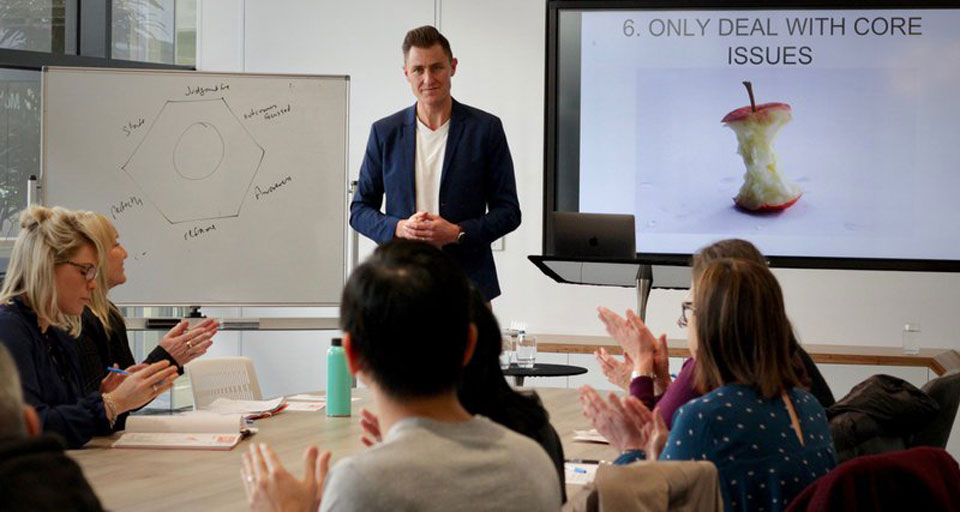4 questions leaders need to ask to resolve conflict at work

Most people (leaders included) are terrified of conflict. The fear is that when two colleagues, teammates, or business partners want different things, it inevitably spells the end of the working relationship. Conflict is then seen as a major problem and to be avoided at all costs. This is such a mistake. Conflict is natural, necessary and unavoidable. It also provides perhaps life’s best opportunity for growth, development and progress. When two adults appear to want different or even opposite things, this is exactly where the fun starts.
The nature of all conflict is that something has disrupted to the natural state of rapport between two parties causing them to no longer feel as though they are on the same team. The space between them is no longer clean. If things are to continue as is, there is now stuff between them that will continue to drive them apart. Therefore, conflict resolution is an essential skill for any leader. Without it, things naturally get worse between your people not better. Here are 4 of the most effective questions leaders can use to resolve even the toughest conflict situations at work.
- What do you agree about?
Most relationship conflict happens entirely on the lowest level of disagreement; that is to battle about the things you are least likely to ever agree about.Resolving conflict from this level is impossible. Each person is positioned as enemies on opposing teams and therefore must fight to the death. There can only be one winner.
However, if you take a breath and draw people up into the highest common agreement instead, this instantly positions them on the same team, allowing them to negotiate as friends helping each other achieve the best outcome. Peace becomes possible only through discovering that at the highest level, both sides want exactly the same thing.
- Are you an adult?
The next priority is to make sure both parties bring their best adult skills to the negotiation and remain adults for the duration of the conversation.Now that they have discovered commonality and sameness, they can treat each other like equals and work through the areas they disagree about in a cooperative manner.
If you’re a fully functioning adult of at least average intelligence, you have the capacity to understand, listen, grow, change, take responsibility, create, collaborate and, most importantly, negotiate. Being an adult gives the ability for both parties to get what they want.
When people are held to a higher standard and required to show up as an adult it gives both parties the ability to negotiate instead of compromise and create a new win/win path that has never existed before.
- Are you showing up as the prize?
For the leader to make sure two adults negotiate rather than compromise it is essential that both parties show up as the prize. This means they must own their value and worth internally and demonstrate the confidence that comes from knowing how much they offer those around them.To truly understand how valuable you are gives the ability to negotiate from a place of power. The moment someone operates from neediness or insecurity on the other hand, they completely undermine their ability to get what they want. Insecurity makes conflict messy, irrational and personal.
Therefore, it is the leaders job to make sure each person is not attached to their desired outcome as their only option in life and to realise their identity is not linked to their role or performance.
- Who has the problem?
The final question makes sure you avoid the blame trap and apply the appropriate leverage to create lasting change. While you may assume the problem owner is obvious, if there are no negative consequences for a person’s poor behaviour, then they have no problem. The person who actually has the problem is simply the one who’s not getting what they want or who’s suffering as a result of someone else’s behaviour.To finally resolve the issue will require more than kind words and lofty promises. There must be painful consequences if things do not change. People are naturally self-centred in their motivations, and so will revert back to doing what’s best for themselves rather than always being committed to the good of the team or workplace.
If someone has been getting away with poor behaviour, it is only when the leader makes it their problem by enforcing a significant consequence that they have any reason to change, and the problem gets solved for good.
Written by Jaemin Frazer.
Have you read?
Elon Musk, Twitter and The New Deal in Corporate Takeovers by Ralph Ward.
How to Set Your Wealth Goals by Ty J. Young.
Why the secret to winning strategy is simple by Rosie Yeo.
Weighing up your options – the art of decision making by Kerry Swan.
Add CEOWORLD magazine to your Google News feed.
Follow CEOWORLD magazine headlines on: Google News, LinkedIn, Twitter, and Facebook.
Copyright 2024 The CEOWORLD magazine. All rights reserved. This material (and any extract from it) must not be copied, redistributed or placed on any website, without CEOWORLD magazine' prior written consent. For media queries, please contact: info@ceoworld.biz









